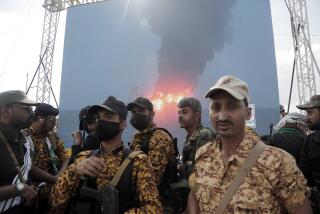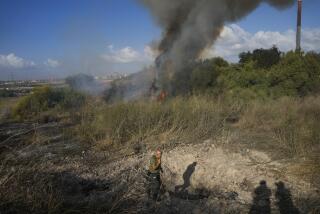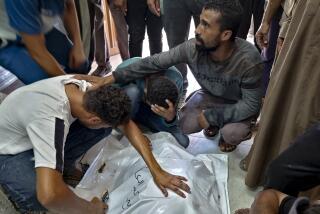Yemen officials say a Saudi-led coalition airstrike on a hotel has killed dozens
It was just after 3 a.m. Wednesday when Naseer Habari was woken up by the sound of explosions. He knew right away it was another airstrike by the Saudi-led coalition fighting a rebel movement.
As chief of Arhab district, about 20 miles north of Sana, Yemen’s capital, he raced to the site of the blasts.
More than 12 hours later, he and others were still removing the bodies from a hotel where officials said at least 46 people were killed and 24 others wounded.
“They didn’t include the corpses that were turned into pieces by the bombs,” he said by phone Wednesday.
It was the latest attack by the coalition that since March 2015 has been waging a punishing air war against Houthi rebels allied with former President Ali Abdullah Saleh, who was overthrown in 2011.
The strike in Habari’s district was one of many the coalition carried out Wednesday around Sana.
Habari said most of the targets were Houthi-controlled checkpoints that had sprung up in and around Sana. It was unclear why the strikes included the hotel, where the greatest number of casualties occurred.
“The place that was hit was a locanda, a simple hotel where the poorest farmworkers sleep,” Habari said. “Then they wake up in the morning to work in the fields.”
“The Saudi aggression has targeted everyone in society,” he said. “They don’t target only Houthis, but target civilians randomly. God has cursed us with a stupid enemy.”
The head of the Houthi movement, Abdul Malek Houthi, condemned the strike. There was no statement from the Saudi-led coalition.
Al Mariah TV, the Houthi satellite news channel, showed images of medical volunteers picking through the rubble of a cinder-block building, finding a dust-covered corpse, wrapping it in blankets and dragging it out of the wreckage.
Yemen has been ravaged by conflict since 2014, when the Houthis, in a surprise alliance with Saleh, overran Sana and forced President Abdu Rabu Mansour Hadi to move to the southern coastal city of Aden and then to Saudi Arabia. Hadi remains the internationally recognized leader of Yemen.
When the Houthis moved on Aden early in 2015, Saudi Arabia, along with the United Arab Emirates and other Persian Gulf countries, launched a counteroffensive to reinstate Hadi and to curb the power of the Shiite Muslim Houthis, whom they consider to be proxies of their nemesis, Iran.
But their campaign, which is supported by the U.S., has devastated Yemen, making it a place where famine and cholera are as big a threat as the bombs falling from the sky.
Since February 2014, more than 10,000 people have been killed, most of them as a result of airstrikes, according to the United Nations. Three million people have been forced to leave their homes, and a land, sea and air blockade by the coalition has made medicines and food increasingly scarce.
Bulos is a special correspondent.
Twitter: @nabihbulos
UPDATES:
2:15 p.m.: This article has been updated with staff reporting on the details of the airstrikes.
6:23 a.m.: This article has been updated with additional background
This story was originally posted at 3:45 a.m.
More to Read
Sign up for Essential California
The most important California stories and recommendations in your inbox every morning.
You may occasionally receive promotional content from the Los Angeles Times.










